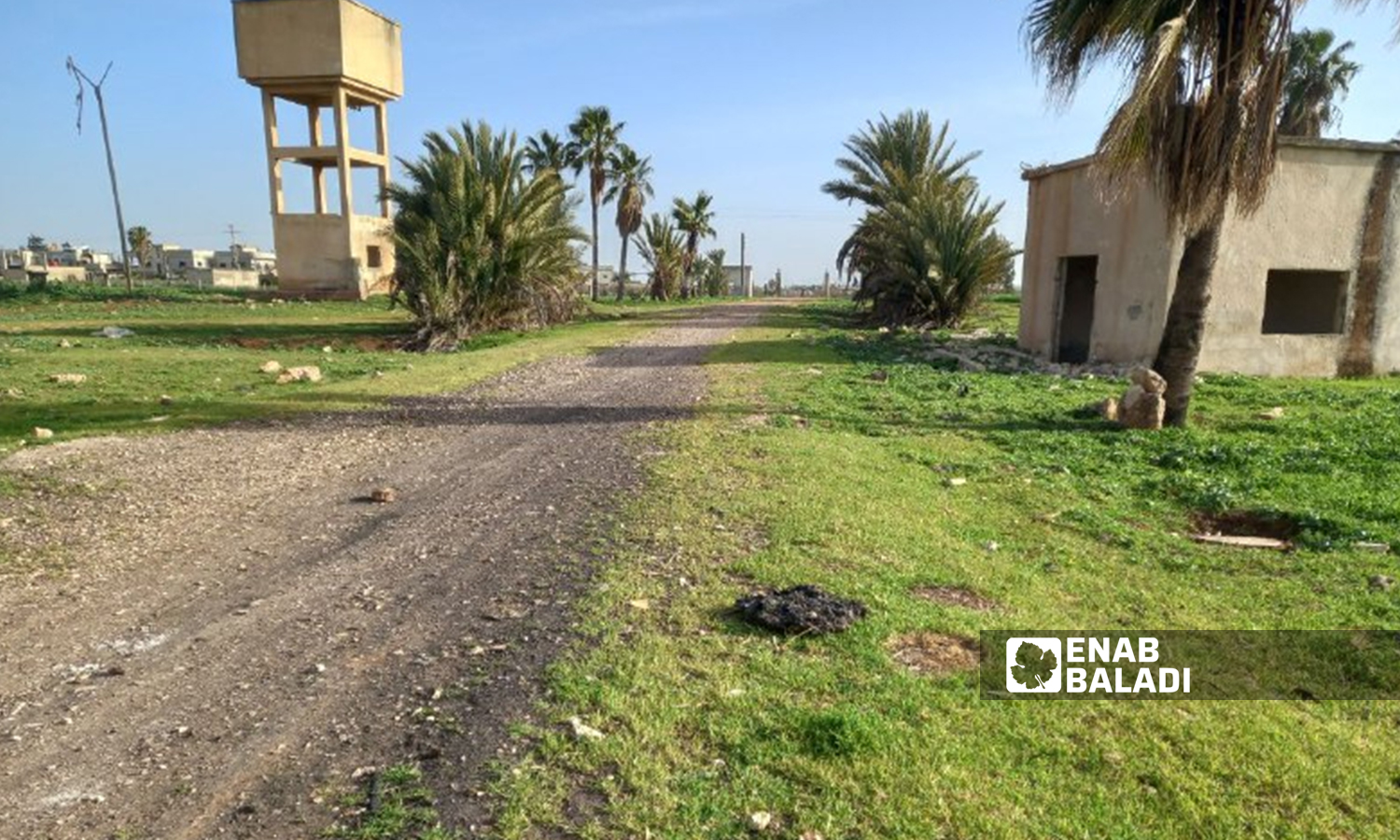



Daraa – Halim Muhammad
Ahmed, 35, wanders through the sections of the Tal Shihab’s plant nursery, which has been turned into a pasture for sheep after the residents of the southern Daraa governorate planted it with wheat and barley this year.
The nursery, which is located in the western countryside of Daraa, was a major source of olive trees, almond trees, forest trees, and ornamental trees in southern Syria, but it has become an abandoned place due to military operations and government neglect.
Ahmed, a former nursery worker (Enab Baladi withheld his full name for security reasons), stands among the destroyed buildings, with a large expanse of land that has turned barren after the wheat harvest.
“How painful this transformation is. Four years ago, the nursery was a green meadow, and today there is nothing left, even pine trees dating back to the nursery’s birth have been cut down,” Ahmed said.
“Life was full of beauty, activity, and love for farming in the nursery, but all of that has been destroyed,” he added.
Ahmed enumerates the nursery sections, starting with the olive section, in which there are greenhouses (in which parts of the olive branches are cut and replanted), a section for almonds, a section for forest trees, and administrative offices.
Ahmed, who worked for 12 years in this nursery, said this place was established in the 1950s, such a long period turned into mere memories with the destruction of the nursery in 2018 due to the military operations.
After the Syrian regime forces regained control of Daraa governorate in July 2018, the work of humanitarian organizations and administrative bodies affiliated with the Syrian opposition ended, and the services of these institutions became under the Syrian regime’s control.
The Daraa Agriculture Directorate has not paid any attention to the nursery since then but has taken it out of service under the pretext of the lack of water, moved the generator that operates the pumps to irrigate the plantings in other places, and did not work to return the dismissed workers, but rather turned the nursery again into a common land shared by the residents of the area.
The Tal Shihab plant nursery is considered one of the oldest agricultural nurseries in Syria, and its establishment dates back to 1948 when it specialized in the production of olive saplings using the method of vegetative propagation.
The Agriculture Ministry was exporting olive nursery products to most Arab countries, especially Jordan, Iraq, Saudi Arabia, Qatar, Sudan, and Oman.
The nursery was robbed and vandalized at the beginning of 2012 and turned into a barren land until 2015, when a group of engineers, technicians, and workers began to restore a small part of the nursery’s works with weak capabilities.
“We started working with voluntary capabilities during the revolution, and I remember the first salary, which was ten thousand pounds from the Daraa Provincial Council,” Ahmed said while holding remnants of forest shrubs in his hand.
Ahmed explains that the effort was focused on restoring the nursery as it was and that the workers were not initially able to grow olives in large quantities because rooting the cuttings requires high capabilities, but efforts have focused on planting almonds and forest trees.
“But our persistence was an incentive for international organizations to support the nursery,” according to the former worker.
Ahmed did not hide his pain over what happened to the nursery and did not expect it to return as it was, as he claims that the mentality of those in charge of government departments is vengeful towards every success.
The Directorate of Agriculture in Daraa did not restore the staff to their jobs and did not appoint volunteers who had experience working. “On the other hand, the regime preferred to destroy the nursery rather than admitting a step taken by volunteers in order to save a public facility in their town,” says Ahmed.
The Syria Essential Services project supported the nursery logistically and financially in 2016 by providing greenhouses and water pumps, which were able to operate wells in them.
According to the estimates of one of the former administrators supervising the nursery, during the armed opposition’s control, the nursery was able to produce about 400,000 olive trees, 200,000 almond and pomegranate plants, and 200,000 forest plants.
The former administrator, who declined to be named for security reasons, added that the nursery distributed seedlings to farmers in the governorates of Daraa and Quneitra almost free of charge, as the price of the plant was 200 Syrian pounds, while it was sold in private nurseries between 1,500 and 2,500 Syrian pounds.
The nursery was one of the most important administrative units in Daraa governorate, and it was creating job opportunities for hundreds of young men in the governorate, in addition to giving the town a green aesthetic, as well as a reliable source for providing tree seedlings at nominal prices.
Most of the olive trees in Daraa governorate came from the Tal Shihab nursery.
if you think the article contain wrong information or you have additional details Send Correction